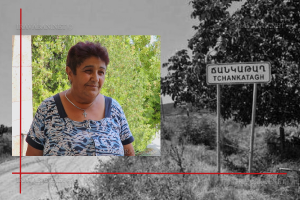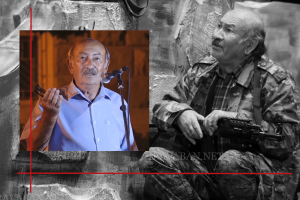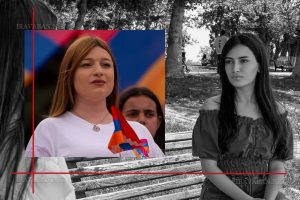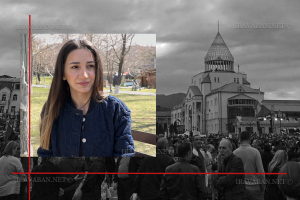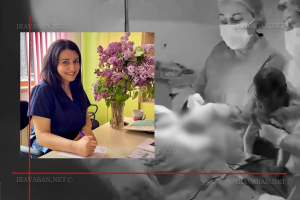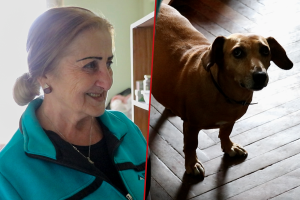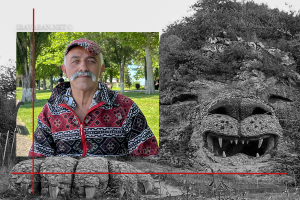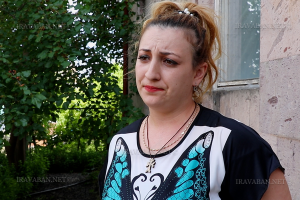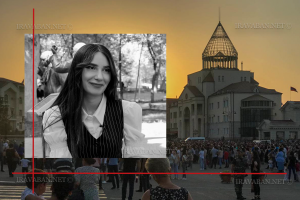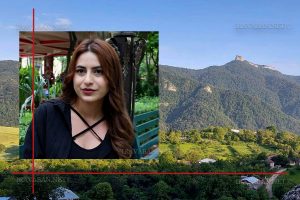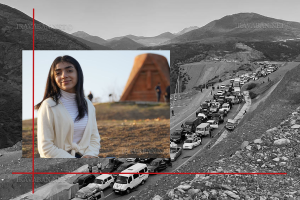Svetlana Arzumanyan, who was forcibly displaced from the occupied Republic of Artsakh, told in the framework of “Artsakh: Armenian Genocide 2023. Stories of Survivors” documentary project of Iravaban.net that she had to leave Artsakh as a result of the war unleashed by Azerbaijan on 27 September, 2020, but returned to her home after the tripartite agreement of 9 November.
“When we returned to Askeran, our village had not yet been handed over, we were going to our home, but in the beginning it was a terrible situation in the city, because Hadrut was handed over, and many territories were handed over to the Turks. We saw the pain people were living with, but we never understood them, but now we really understand what it is like when a person has no home. But I must say that we were not afraid of the Azerbaijanis at all. We were in our homeland, we were in our home, we were never afraid of them, because there was a border and we were sure that we were living in our homeland, on our land,” she said.
According to Svetlana, there have always been shootings. She worked at the “Republican” Medical Center in Stepanakert and always witnessed the wounded being brought. “They (the Azeries) always violated the ceasefire, there were always injured and victims from our side.”
Our interlocutor says that the nine months of the blockade were also very difficult.
“We always hoped that, as the Karabakh people say, ‘Loch (everything) would be fine’, but in the end we saw how “fine” it turned to be for us. The Russians brought food and sold it to us at double the price, but we bought it, we didn’t mind the price, so there would be something to buy. Then, little by little, everything became scarce, but we were finding a way out, and in the last month and a half, there was nothing at all, not even flour. But we were still hoping that everything would over, we would stay in our house,” our interlocutor says.
Due to her profession, Svetlana had more contact with sick people, she says that people had no immunity, and they had to sparingly use certain medicines left in the besieged Artsakh.
“We were in a war zone, we didn’t know what would happen, how the events would develop, and that was why we did everything so that, if there was a war, we could at least provide first aid to the wounded. As you know, there was also a case of death from starvation. The women, children and men were very weak, they often had fever, whenever they caught cold, they came to the hospital feeling sick all of a sudden,” she says.
Our interlocutor was in the hospital on 19 September, when the enemy unleashed another aggression against Artsakh.
“Everything was very quiet, but for the last two weeks it was alert number one for us, but it had already become normal. In the afternoon of 19 September, the wounded were brought one after the other, there was no pause. The wounded were constantly being brought. The injuries were different, fracture, open fracture. A sad incident happened: on that day two brothers of one of our nurses were brought; one was dead, and the other died at us. On the other side relatives kept coming, but at that time we still had medicines. Then, starting 21 September, a sniper was shooting on Stepanakert. One of our doctors was hit by a sniper in front of the hospital, but the bullet stick in his jacket. One of our nurses wanted to come to work, but the ambulance brought her because she was hit in the back. Such things happened,” she says.
Svetlana was still in Artsakh when a gasoline warehouse exploded in Stepanakert. She had said goodbye to the staff and returned home to pack her things, but she received an urgent call from the hospital.
“I received a voice message, one of our nurses was crying and saying, “Whoever is there, come, a lot of wounded people have been brought. My sister and I, she is also studying medicine, immediately ran to the hospital. The situation at the hospital was extremely terrible, I cannot describe it in words. My sister and I could not even enter through the main entrance because all the people’s relatives were there. We entered from the backdoor of the hospital, when we entered, my feet got wet immediately; the entire floor of the hospital was wet of furatsilin solution. There were a burnt persons on every half meter and there were more than 200 burnt and bare men, most of them with 3rd degree burns. There were many people who had lighter burns, but they had no immunity, and after exactly two hours, all medicines ran and people began to die one after another. It was terrible, we couldn’t help anyone. Even the sheets had finished. I understood on that day the meaning of the word chaos. Everyone was screaming, all were coming to open the bodies to identify their relatives. I even remember a case when a 15- or 16-year-old child came and began taking bodies down from the intensive care unit with me. There was such chaos in the hospital in Stepanakert,” she says.
Svetlana and her family left Artsakh on 29 September.
“First of all, we left ourselves there. Our life was divided into two parts, we left our homeland there,” she says.
Referring to the reintegration option proposed by the Azerbaijani side, she notes that it is not possible to live side by side with the enemy.
“It’s unbelievable, they committed genocide, we lost our homeland, how can we live with them, it’s impossible,” our interlocutor emphasizes.
Svetlana says that she no longer has any expectations from the international organizations and the public, because 120 thousand Armenians were left homeless before their eyes. “The world is blind.”
——————————————————————————————————————
“Artsakh: Armenian Genocide 2023. Stories of Survivors” documentary project of Iravaban.net is aimed at collecting the memories and testimonies of citizens forcibly displaced from Artsakh occupied by Azerbaijan, about the genocide of the Armenians of Artsakh committed by Azerbaijan, atrocities, the days of war, the path of deportation, etc.
Iravaban.net seeks help from citizens who will voluntarily agree to translate materials into different languages: Russian, English, French, Arabic, Persian, Turkish, Georgian, Chinese…
You can write to our e-mail address at: [email protected]
To donate for realization of the project: https://iravaban.net/en/become-a-supporter
Armenian Lawyers’ Association is the author of the idea “Artsakh: Armenian Genocide 2023. Stories of Survivors” documentary project of Iravaban.net and is the owner of copyright of the materials created within the framework of the project. In case of using the materials produced within the framework of the project, it is necessary to obtain the written permission of the Armenian Lawyers’ Association.
Hasmik Sargsyan

